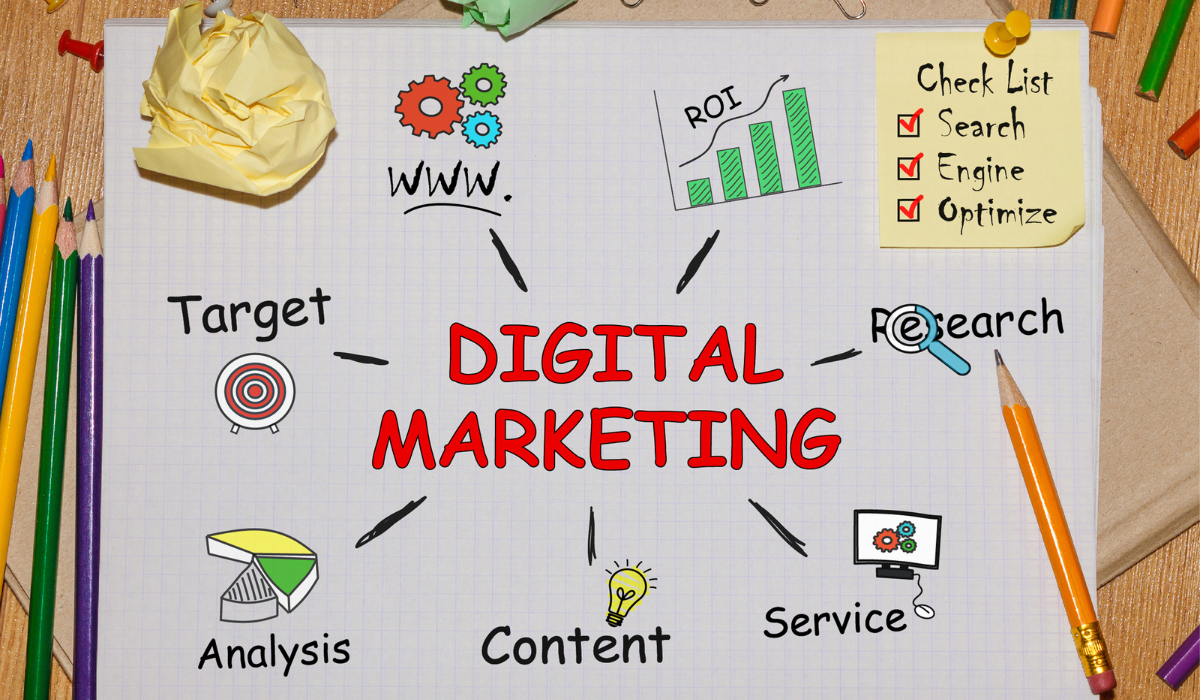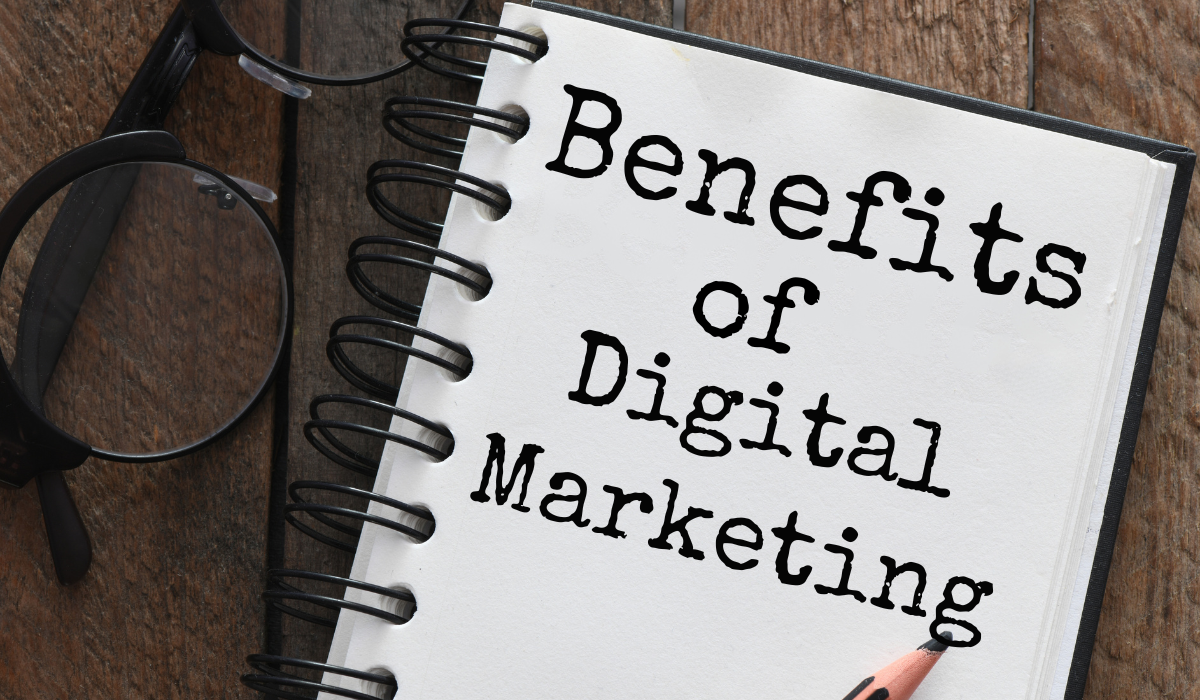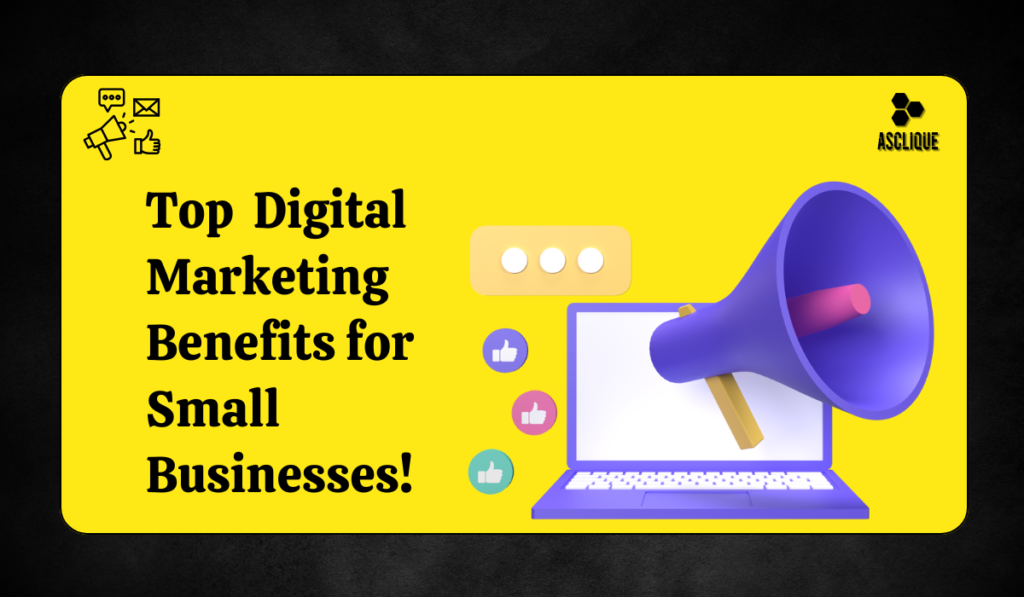Since digital technology permeates life today, small businesses have an open field to connect with their target audience. This becomes the go-signal for many entrepreneurs who could have been beach-stranded in battle with big corporations in the past, says a business publisher. What are the benefits of digital marketing for small businesses? Let’s see how it provides vital support.
What is Digital Marketing?

Digital marketing promotes products or services through channels like search engines, social media, email, and websites. It encompasses every communication activity aimed at reaching out to, creating a relationship with, and finally achieving the sale from the target audiences. More importantly, it differs from traditional marketing, which majorly relies on TV, radio, and print ads, where digital marketing harnesses online platforms that allow for direct instant access to elaborated data, which means businesses can manage their marketing better.
The main digital marketing forms comprise of:
Search Engine Optimization (SEO): That is optimizing your website to rank higher in the search engine listings.
Pay-Per-Click (PPC): An advertisement method where you pay for every click on your advertisement.
Social Media Marketing: That is using Facebook, Instagram, or LinkedIn to find customers.
Content Marketing: Valuable content developed to attract and retain your target customers.
Email Marketing: Targeted emails mailed to keep the customers well-informed and interested.
Benefits of Digital Marketing for Small Businesses
Here are the benefits of digital marketing for small businesses:

Cost-Effective Marketing
One of the important benefits of digital marketing for small businesses is that it is less cost-intensives. While traditional channels for marketing like television, radio, and prints often have a hefty price tag, it is usually too expensive for low-budget companies.
- Digital marketing allows small businesses to engage in their fair share of targeted ads on social media or search engines at a fraction of the cost of traditional advertising.
- Performance-based optimization of campaigns-this way, you will only pay for what works.
Stat Alert: HubSpot says that when compared to traditional marketing, companies that use inbound save more than 60% per lead.
Reach an audience that matters
You can focus your firepower on the audience, not fire off into the darkness and wait for hope. You will discover that small businesses can target ads to demographics, interests or behaviors so that they can hit the right potential customers who are more likely to engage. This laser-like targeting ensures that every pound is used wisely.
A small business can utilize Facebook Ads and Google Ads as follows:
- Target users based on location, age, and interests
- Retarget customers who have demonstrated interest in your product or services
Leveling the playing field
Digital marketing proves that there is a level playing field where even the smaller businesses can battle for market share together with bigger competitors. Small businesses can easily outperform big brands on the same grounds of visibility and engagement with an imaginative and planned strategy.
Startups could:
- Build customer relationships through social media engagement.
- Utilize SEOs to rank top within search engines to gain organic traffic, which is very much free and doesn’t cost billions of dollars in marketing budgets.
Measurable Results
Digital marketing gives crystal-clear results which traditional marketing never did. With the help of tools such as Google Analytics, Facebook Insights, and all other email marketing platforms, businesses can track every single detail about how their campaign is performing.
Some KPIs small businesses can track are:
- Website traffic
- Conversion rates
- Social media engagement
Stat Alert: Datareportal is estimating that more than 4.89 billion people are now active online around the world. This leaves small businesses to capture thousands of customers and advance through digital connections across their behaviors online.
Customer Engagement End
Digital marketing also builds the relationship that small businesses have with customers. When a business participates in social media, including Instagram and Facebook to be linked to LinkedIn, it reaches their audience directly. The engagement will help to answer questions, comment back on things, and share great content that creates and solidifies a loyal customer base.
Example:
- A way to have meaningful conversations with a potential customer is by running a poll and asking questions.
- Engagement through comments helps a company build trust and makes the brand more accessible.
Brand Building
A recognized brand is a prerequisite for small businesses. Digital Marketing affords various touch points such as social media, blogs, and email marketing, and the list can go on to give voice and identity to your brand. Each time your customer contacts your business, her perception of your brand is built.
Good strategies to build one’s brand include:
- Content sharing in consistent manner with inherent relevance and value.
- Interaction and response to feedback within reasonable time frame.
Stat Alert: 86% of consumers want to buy from brands they feel an emotional connection to, meaning that brand identity is super important for small businesses.
Local SEO for Better Visibility
Local SEO is a great tool if you have some form of small business in which you work with a local target audience; optimize your website to appear on location-based searches, and let’s get more customers from your area. With features like Google My Business (GMB), it makes your business appear in search results within a local scope and on Google Maps, therefore driving foot traffic and increasing visibility.
Tips to improve local SEO
- Optimize your GMB profile with accurate business details.
- Collect and respond to online reviews that will eventually help you build your credibility.
Adaptability and Scalability
The second advantage most people do not know about is how digital marketing affords flexibility to small businesses. One can start at a scale where campaigns run with the lowest budget possible, and as the business grows, it scales upward. For example, anyone can drop the Google Ad campaign and try all kinds of content marketing. This is one area where the directions can be changed based on what works in digital marketing.
For instance, if a particular social media channel is not performing well. A business will not have to face the hassle of downtime while transferring its budget to the next most efficient channel.
Personalized Customer Experience
This is another advantage of digital marketing. With digital marketing, businesses can directly reach out to their target audience’s needs and preferences. With data-driven plans, you can divide your targeted audience and make specific marketing campaigns for that audience.
Example:
- Personalized email with product recommendations based on previous purchases.
- Only for loyal customers
- It will give more loyalty and higher conversion through this personalized touch.
Conversion Rates
Digital marketing, like email marketing, content marketing, and even engagements over the social media, works really well in converting leads to paying customers. Once the trust is gained and value is delivered, the leads can be groomed, and passing through the sales funnel becomes smooth and efficient for small businesses.
Stat Alert: Companies that utilize web marketing have shown to get 2-3 times higher conversion rates compared with organizations that use traditional methods of marketing.
How Digital Marketing Boosts Growth of Small Businesses

Increased Visibility
The most significant advantage of digital marketing is the increased visibility of small businesses. This is how it works:
- Search Engine Optimization: By optimizing your website with relevant keywords, your business can rank higher on Google search. Hence, it enhances one’s chances of being found easily by the customers if they search for some product or service.
- Social Media Presence: Facebook, Instagram, and LinkedIn allow you to be present before your target audience, where they are even if they are not in a looking-for-your-services type of mindset.
- More Website Traffic: The strong digital presence breaks through the noise and makes more people visit your website, there where they’d be looking for your business.
Stat: 93% of all online experiences begin with a search engine. The more visible you are the better.
Lead Generation
Digital marketing offers a great avenue for lead generation. Here’s how small businesses can take advantage of it:
- Pay Per Click Advertising; Small businesses can pay to place bids on keywords relating to the product or services being targeted to reaching people who are searching for them. PPC ads show up on top of the right hand side result page helping people reach those people with high purchase intent.
- Email Marketing: Get leads using sign-up forms and continue to nourish them with valuable content that keeps you top of mind.
- SEO for Lead Generation: When your site appears in the search results for relevant keywords, people organically find you without paid ads
Stat: Companies involved in email marketing activities report an average ROI of $ 42 dollars for every dollar invested. One of the cheapest lead generation tools
Increases Revenue
More eyeballs and qualified lead generation, of course, translate to more revenues. And here’s why:
- Targeted Marketing : Digital marketing allows small businesses to target specific audiences on demographics, location, or interests. This way, you are spending your money with people most likely to get converted into customers.
- Remarketing: This strategy allows companies to display ads to users who have visited their site and haven’t yet converted them; this will push such prospects back and convert them.
- Lookalike Audiences: Using tools like Facebook and Google, firms can reach out to people whose profile has a similar characteristic as that of their customers. These will be more likely to convert.
Stat: According to following all digital marketing strategies successfully, a company increases its conversion three to four times from traditional marketing strategies.
Leverages Customer Loyalty
While the above attract new customers, in-built loyalty is also quite important. Here’s how it happens with digital marketing:
- Interactions Personified: When business owners interact directly with audiences through comments, messages, and engagements, trust and loyalty are built.
- Content Marketing: Regular releasing of meaningful content, such as blogs or videos, keeps the customer engaged and lets your business project as an authority in its particular industry.
- Email Campaigns: Use email marketing to keep in touch with the current customer by reaching out to him with personalized product suggestions, special deals, or just keeping them connected by sending regular updates.
Stat: Improve customer retention rates from as low as 5% to increase profits by 25% to 95%.
Competes with Larger Brands
Digital marketing has made it easier for small businesses to compete against giant companies. Here’s how:
- Google Ads and Facebook Ads: Small businesses can display their ads on the same platforms and across the same keywords as large businesses, allowing them to play at the same level.
- Local SEO: Optimizing your website for local searches- for example, “best coffee shop near me”- enables small businesses to attract the attention of locality-seeking customers who require the services they offer nearby.
- Niche Targeting: Since the niche audience can be reached with hyper-local or specific targeting options, small businesses may look to carve out a niche and differentiate themselves in an endeavor from national or global competitors.
Stat: 46% of all Google searches are actually looking for local information. Optimizing to local SEO gives a competitive edge to small businesses.
Challenges of Small Businesses in Digital Marketing
There are also some key challenges to small businesses in digital marketing:
- Low Budgets prevent small businesses from keeping up with the larger company ad spend.
- Lack of Core Competency prevents owners from effectively implementing a strategy using SEO, PPC, or social media.
- Time is Limited because owners may be very hands-on running the business and not have time to market on a regular basis.
- Difficulty Measuring ROI makes it challenging to identify which campaigns actually work.
- Inability to Keep Up with Competition: The science of digital marketing is changing with trends-very difficult to keep pace.
Solutions for Digital Marketing Problems
Among these, the small businesses can;
- Focus on Low-Cost Strategies like SEO and content marketing-high ROI return with minimal investment.
- Engage freelancers or agencies to fill in the gaps of the technical knowledge or use easily available tools, for example, Facebook Ads, Google My Business.
- Use automation tools; such as email marketing platforms, like for example, Mailchimp, and social media scheduling, for instance, Hootsuite, and Buffer so that not too much time is wasted.
- Utilize analytics tools such as Google Analytics to track performance and measure return on investment.
- Keep track of the trends by constantly experimenting and innovating through the latest digital marketing trends to keep up with competitors.
Conclusion
Digital marketing will, in today’s competitive marketplace, prove too important for small businesses to ignore. From cost-effective advertising and measurable results to building brand loyalty and improving local visibility, digital marketing provides the tools that small businesses need to thrive. The benefits of digital marketing for small businesses include growing by transcending the challenges it throws across its way and being flexible and engaging with customers while creating long-term relationships.
FAQs
What is digital marketing?
Digital marketing involves using online channels to promote businesses, products, or services through the internet and digital devices.
Why is digital marketing important for small businesses?
It helps small businesses reach their target audience affordably, build brand awareness, and track performance in real-time.
How can small businesses benefit from digital marketing?
Small businesses can enjoy cost-effectiveness, targeted audience reach, measurable outcomes, increased conversions, and improved brand identity.
What obstacles do small businesses encounter in digital marketing?
Obstacles include tight budgets, limited expertise, and time constraints. Solutions involve implementing cost-effective strategies like SEO or outsourcing marketing tasks.

